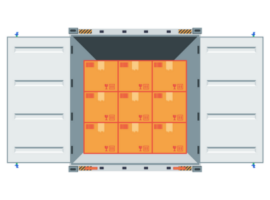Are you wondering how to make the jump from the UK to the Netherlands? Pondering the required paperwork and hoops to jump through to get yourself settled in this Cultural Gem of Europe? We’ve got all the info and steps to help you easily organise your relocation to the Netherlands. ‘Ben je er klaar voor?’ – ‘Are you ready?’
Estimated reading time: 9 minutes
Table of Contents
Cost of Moving to the Netherlands
The ballpark figure for moving from the UK to the Netherlands is around £600, with container shipping generally being the best option. It’s a smart choice because the Netherlands is home to several major European ports. Go ahead and take a look at the estimated removalist costs for emigrating to the Netherlands:
| House size | 20ft Shipping Container | 40ft Shipping Container |
|---|---|---|
| 1-3 Bedroom Flat | £234 – £259 | £360 – £398 |
| 3-5 Bedroom House | £360 – £600 | £684 – £756 |
Start Your Dutch Adventure Now!
Understanding the Price of Your Relocation to the Netherlands
Several factors determine the cost of your move from the UK to the Netherlands. In the following paragraphs, you will find the nitty-gritty of these and how they can each impact the price of your removal to the Netherlands:
1. Transport Type
The cost of shipping your belongings to the Netherlands with an experienced international moving company hinges on your preferred transportation method from the options listed below:
1.1. Land or Road Transport
Land transportation is the simplest and fastest form of transportation when moving to the Netherlands. Transportation by land is the easiest form of transportation because there is a variety of moving options.
1.2. Sea Freight
Transport by sea is a good solution for big removals, for example, if you move from and to a 4-room apartment. You’ll have a 20-foot or 40-foot container to fit all your household items. The Netherlands, especially the city of Rotterdam, is part of the main sea route in the European Union. However, shipping by boat is generally the slowest type of transportation.
1.3. Air Freight
Transporting all your cargo by air is the fastest way, because it takes 1 or 2 days which can be quite convenient. It is usually the most expensive way of transporting your cargo since the shipping cost is based on weight.
2. The Weight of the Cargo
The weight of the cargo is crucial as it dictates the cost of the move. If you choose to move by air you will pay depending on the weight of the cargo, while by road some routes may have weight restrictions and this will mean looking for alternative routes. The longer you are on the road the more you pay the movers, and if you are driving yourself, the more the money you spend.
3. The Distance of the Move
In most instances moving companies tend to lower their prices during the winter period, therefore, if you are planning on a move and you are on a tight budget then this should be your preferred period. This will also ensure that you get top-quality moving service at an affordable price in comparison to moving either during summer or spring.
4. Your Chosen Moving Services
The thought of moving all your household items to the Netherlands is a stressful task. It is, therefore, wise to hire a moving company that will work on your old house and new house to make the move easier for you. Here are the most popular moving services offered by the majority of our large partner network of trusted removalists:
4. 1. Packing
The basic function of the moving service is to pack and move your belongings into boxes and label them accordingly. The best part about hiring them is the fact that they provide their own handyman who disassembles everything professionally when you move out and reassembles them when you move into the new house. They also provide the packing boxes.
4. 2. Delicate items
International removal companies provide specialised expertise in handling delicate items like antiques, relics, pianos and other valuable assets like paintings or artwork.
4. 3. Cleaning
This moving service will clean your old place a good clean when you leave and can similarly make sure your new home is spick and span before you arrive.
Cleaning services for your old house may be important in case your tenancy agreement specifies it as a requirement to get your deposit back.
4. 4. Storage
Your moving company can also provide storage services to store your belongings at a convenient rate, in case you don’t want to move everything at once.
5. Access to Your Properties
As a first step, the moving company will organise a technical visit to your home to expertly assess the volume of your removal. This survey also helps to plan for the practical aspects of your move, like accessibility, whether they’ll need to bring a lift and how many movers to send. Overall, it will allow your removal company to get you a reliable quote and accurately prepare for fulfilling your move smoothly.
They can also check out your new accommodation in the Netherlands, either via a local partner or online. After all, Dutch houses have very narrow stairs and often a lift is necessary.
Administrative Steps for Your Move from the UK to the Netherlands
To kickstart your Netherlands relocation, there are two important aspects to consider: the logistical side of your removal and the administrative procedures when leaving the UK to settle over in the Netherlands. Based on the Government of the Netherlands website, here’s a step-by-step of what you need to sail through the Dutch administrative procedures:
- Administrative registration
- Social Security
- Bank account
- Registration of your vehicle in the Netherlands
- Public transportation card (OV-chipkaart)
- Taxes and tax situation
1. Registering as a Resident in the Netherlands
If you plan on residing in the Netherlands for more than 4 months, you must register with the Personal Records Database (BRP) within 5 days of your arrival.
What is the BSN Number?
Registration with the BRP enables you to obtain your Citizen Service Number (BSN). This individual and unique number is like your personal key to any administrative procedures in the Netherlands. It facilitates all your interactions with the Dutch authorities – from taxes and local fees to health insurance, banking, job hunting, and more!
Documents You Need to Request Your BSN Number
You can make your registration at the office of your local municipality (Gemeente) with the following documents:
- A valid identity document (national identity card, passport, driving license)
- A certificate of residence from your landowner
If you do not yet have a fixed address, you must register as soon as your rental contract is signed.
Quick heads up: It is illegal to reside in the Netherlands for more than 4 months without getting your hands on a BSN number. It’s the rule!
2. Dutch Healthcare
Anyone moving to the Netherlands is required to apply for Dutch health insurance within 3 months. The Dutch healthcare system offers minimum coverage for healthcare costs defined by the Dutch Ministry of Health. The average cost is € 110 per month. However, you can choose premium insurance if you want to have additional coverage for your dental costs, for example.
It’s a good idea to visit the Health Insurance Information Line (Zorgverzekeringslijn) for anything you might want to know about Dutch health insurance.
How Does the Healthcare System in the Netherlands Work?
The Dutch healthcare system covers part of your medical costs. However, each citizen must pay an “eigen risico”, a deductible, of at least € 385 with basic health insurance. You can change or modify your health insurance only at the end of each year, before January 1.
How to Register With a GP in the Netherlands?
While it’s technically not mandatory to register with a general practitioner, it is required to be registered with one before you can make an appointment for a medical consultation. You must choose a doctor in the neighbourhood of your residence. You do not need to pay any fees when you have a consultation with your GP.
Pharmacy and Specialists
In parallel, you might also want to sign up with a local pharmacy, so your doctors can send your prescription there. And remember, if you ever need to consult a specialist, you have to set up an appointment with your GP first and request a referral – just like back in the UK. The cost of specialists, if covered by your insurance, will be paid automatically.
3. Opening a Bank Account
It’s easy to open a bank account in the Netherlands. You just need to bring your BSN number and proof of address. This is very important as some shops, supermarkets and restaurants may not accept Visa or other credit cards.
iDeal Payment System
Payment via iDeal is another widely used solution for online payments. This safe payment solution is offered for free by all Dutch banks. You can also apply for a credit card based on your monthly income. However, credit cards are not as commonly used in the country.
4. Vehicle Registration in the Netherlands
If you move to the Netherlands with your vehicle, you must change the registration of your car. You have to pay several taxes for this, such as VAT, but also BMP (vehicle tax) and other taxes. In addition, you must have automobile insurance and pass the Algemene Periodieke Keuring (APK) safety inspection.
What is the Road Tax for Vehicles in the Netherlands?
The Netherlands are not particularly “motor vehicle friendly”. Every driver has to pay a monthly or quarterly tax to have the right to use the roads here. This road tax called motorrijtuigenbelasting or wegenbelasting, depends on the model of your car.
5. Request a Public Transportation Card (OV-chipkaart)
Getting around the Netherlands is incredibly convenient. Cycling or biking is the go-to way to get from A to B, and the country holds the world record in the number of bikes per person! If pedalling isn’t your thing, you can also travel by train, which takes you everywhere around the country thanks to the extensive Dutch rail network.
To use public transportation, you need an OV-chipkaart which allows you to travel by train, bus, tram or metro, anywhere in the Netherlands. You can request your personal transportation card online or get a temporary one at every station.
Kickstart Your Move to the Netherlands
Why Consider Moving to the Netherlands?
The Netherlands hosts a very large expat community. Since almost 94% of the population is fluent in Dutch and English, it is very easy to integrate with the local community. In addition, the Dutch enjoy an excellent quality of life. Despite a cool and humid climate, there are many outdoor activities (festivals, carnivals, cinema, beach, etc.) and the terraces bustle with activity in the spring and summer.
Where to Move When Emigrating to the Netherlands?
The province of Holland is the most populous region in the Netherlands, with the cities of Amsterdam, The Hague, Utrecht and Rotterdam:
The Hague
The Hague is home to the country’s political institutions, international organisations and embassies. It is a city with a very family-friendly atmosphere.
Amsterdam
Amsterdam is the capital and cultural heart of the Netherlands. The highly populated city hosts numerous major European headquarters. However, the cost of accommodation in Amsterdam is very high and the competition is fierce.
Rotterdam
The city of Rotterdam is home to the first European port. It is a multicultural city that’s home to more than 170 different nationalities. Completely devastated during the Second World War, the city has remarkably risen from the ashes. It is recognised today for its bold architectural style and skyscrapers. Its activity is focused on its port, logistics and petroleum industries.
Get to Know the Netherlands: 4 Intriguing Insights
1. If you move to the Netherlands, you should know that about 17% of the land is below sea level. Indeed, about a quarter of the Netherlands’ total landmass was reclaimed from the sea.
2. The Netherlands is also home to the International Criminal Court (ICC) in The Hague.
3. You will not miss the many canals all over the country; the famous tulip fields which can be visited during the April-May period; gouda which is the national cheese; or the blue Delftware.
4. Finally, the country has a rich cultural history and offers big names from museums such as the Rijksmusem, the Van Gogh Museum or the Mauritshuis in The Hague if you want to admire Vermeer’s paintings.



